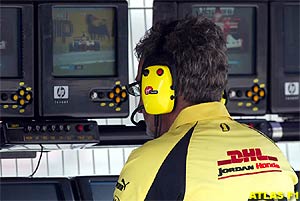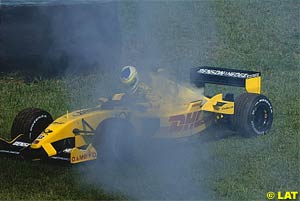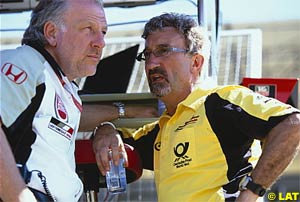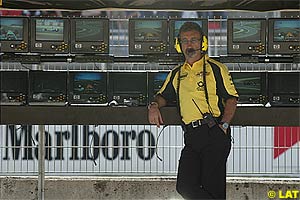
Atlas F1 Contributing Writer
2002 is a pivotal year for Eddie Jordan. After taking his team up to third in the Constructors Championship some three years ago, the outfit took a tumble down even since, and now - reaching perhaps an all time low - 'Eee-Jay' is stepping in and making some difficult decisions, to secure the future of Jordan Grand Prix. Timothy Collings, who followed Jordan for more than a decade now, talked to the flamboyant Irishman in Barcelona - about business, about losing, about the automakers and about his plans
Holding court, Jordan twitched with nervous energy as he talked. He often began sentences that had no clear final destination. He gave answers to questions that missed the point. But throughout an impassioned plea for greater understanding and more help in preserving not only his racing team, but also the series in which he races, he was thoroughly genuine. His team, he said, does not carry debt. Nor does it wish to do so. It is a result of enforced discipline, necessary because Jordan Grand Prix is essentially an entrepreneurial outfit, a team that lives from year to year on its ability, its performance and its promises to deliver.
As a result, this time, it was timely, important and worthwhile to listen to the man with more words than most discussing his favourite subject: money. In essence, of course, Eddie wanted to make certain that his message was conveyed, that his team was prudently-managed and that the future, with Honda as partners, remained secure. In all of that, he succeeded without reservation. He did not want people to think he was in trouble, acting in panic, or running scared.
That staff cuts of 15 percent of the workforce, or 45 people, executed partly last November in a first phase and again last week, were taken to reduce the costs for 2003, of course, not 2002. In real terms, this meant that deeper cost cuts would be affected as well since many of the engineers leaving would trigger further costs in research and development. Perhaps, some say, as much as three times their cost in salaries.
For the record, too, it should be stated again that Jordan are in the middle year of a three-year contract with Honda and that stories suggesting that the Japanese manufacturers are contemplating anything other than remaining committed fully are said to be so wide off the mark that they are off the Jordan radar. Indeed, one team source suggested that the Jordan budget for this year is equal to any it had in the past, confirmation indeed that the team is executing sensible plans for the future rather than panic measures to hide a current problem.
They all admit, too, in both the BAR and the Jordan camps, that the power delivered from the Honda engines is not enough for now. Nor for the future. So, things must change. Performance is all in F1. It dictates the results. It dictates the amount of media coverage, the value of the marketing tool that the sport has become and the size of the sponsors' cheques and the ease with which they are secured.
But all of this was perhaps a little much for breakfast. In Barcelona, after all, the hours are Catalan. Some may say Spanish, but the locals may not agree. This means late nights, dinners ending after midnight, bleary eyes in the morning and a more compliant and stodgy group of reporters assembled in the paddock when required for action. And, in the early-summer heat wave that brought temperatures of up to 30 degrees Celsius to Barcelona last week, few media men or women were running around.
Eee-Jay was sharp, however. The sound-bytes were irresistible and the message consistent and dramatic. Admitting that the recession worldwide has cut into his and other teams' ability to compete with the increasingly heavily-backed manufacturer-owned or manufacturer-supported outfits at the front of the grid, he said: "I will demonstrate a fighting spirit by the end of the year to prove Jordan is back with a purpose for sustained success." He made it clear, too, that he will never, if possible, "want to sell out to a manufacturer."
"Everyone tells me that they (Honda) want to do a runner, but if they feel they want to do that, I don't know that," he said. "They have another year to run in 2003. We are planning ahead."
As he talked, sharing his feelings as openly as ever, it was clear that Jordan had had to dig deep to reach his tough decisions. He was wary, however, of allowing talk of any kind of crisis in Formula One running away from him. "This sport, F1, is the envy of the world and we should not talk it down," he said. "But we have a blip. A big blip. And we have to make sure it is around in the future... At the moment, what we are doing is washing money down the toilet, for no reason."
Jordan wants to see major cuts, planned properly and introduced in a programme of changes designed to show that the business side of the sport is under control. "I consider myself to be a proven businessman. I believe in making a profit," he said. "I want to stay in business as an entrepreneur. I will stay in business."
It was richly ironic that, for the first time this year at a Grand Prix, the most significant visitor was a Frenchman. Not Henri Leconte, the famous tennis player, now part of the seniors' tour, who was Jordan's personal guest and staying with his family on their boat in the old harbour. No, the significant man was Alain Prost.
The four-times Champion, once so great that he could barely walk unmolested in a Formula One paddock, quietly slipped into the circuit and took up a guest's position with Ferrari. The diminutive former driver, of course, was at the head of the Prost Grand Prix team that collapsed this year, an experience for which he was vilified in France and humiliated across the world.
How ironic that Jordan, unaware of Prost's appearance in the paddock, said: "It's a big sorrow for me that Alain Prost is not here... I don't want to follow him down that path, but we are not in that position. I want to make sure that we break even this year and have an even better chance in the future. I felt the team was going away from me. The only thing I could do was grab it by the throat and say 'I'm not going to put up with this'..."
It was strong, emotive and rhetorical stuff. This was a man with a passion talking about his team. It threw up questions about Formula One and about Jordan. Is this a sport about passion? Or a business about pragmatism? Is it only for a defined elite of well-heeled rich men of fabulous wealth backed by limitless supplies of supporting finance from car manufacturers?
"We tried too much, we tried to build and grow the business in the way that others have done it," he admitted. "In the last few years, we thought we were in the top three and belonged there and needed to have the kind of resources and staffing levels that McLaren have got. But we are not a corporation, are we? Jordan is a family outfit, a racing team. We are one of the old independents. And I worry for the future of the independents, the privateers and the colour of the sport."
More irony, of course, was to become apparent later last weekend in the race when the three big teams, backed by Fiat, BMW and Mercedes-Benz, filled the podium, but privateer teams, using customer engines, followed them home. More, too, in seeing not only Prost, but Jean Alesi, also, in the paddock on Saturday. And then, afterwards, in learning on Monday evening back in Britain of the sad death, aged 84, of one of the greatest privateer entrants of them all in the golden era, Rob Walker.
This sport-business about which Jordan was talking in emotive, anguished terms, was one that Walker would hardly have recognised. "They want to own a significant percentage of the company that controls F1's commercial rights," Jordan explained, when asked about the car manufacturers' ambitions and threats of taking over, or running their own breakaway series. "And they have threatened to set up a breakaway championship in 2008 if they do not get it. But, I have a fear of a fully manufacturer's championship.
Jordan is struggling this season and this was more apparent than ever in Barcelona where both of his cars were being re-loaded on the transporters before the race was run. Both retired in the opening dozen laps. Jordan now sits at the foot of the Championship without a point and with only one other pointless team above him, BAR, similarly powered by Honda. Yet it was only in 1999 that Jordan was challenging for the Championship with Heinz-Harald Frentzen (about whom, it is said, Jordan is now prepared to concede, in private, that he made a mistake when he sacked him last year) leading the way.
The "necessary cuts" in the week before the Spanish race were painful, but were also a blood-letting symbol of the team's concession, and Jordan's, that they had gone down the wrong road. Jordan had started to copy the big boys, he had brought in 'star' engineers and designers, imported big names, built up the work force and the team had lost their original identity. It is said that Honda offered to buy Jordan out three years ago, but Jordan refused. Last week, in Spain, he showed no signs of regretting that decision. He remained defiant.
"We need to be leaner and sharper," he said. "We announced that staff numbers would be cut by around 15 percent, maintaining a workforce of just over 200, in a revised structure to return Jordan to a more flexible, open style of organisation. That is Jordan returning to its roots. Jordan has always been at its best when lean and efficient. Once you sense complacency creeping in, or costs become exorbitant, a prudent business needs to take action. These are the changes that will generate a more efficient structure at a time when our focus is on the performance and reliability of our cars and that is what is most important.
"As I said, I felt it was going away from me, and the only thing I could really do was grab it by the throat and say 'I'm not going to put up with this'. And to suggest that Honda is part of my thinking behind all of this is completely wrong. I did not once, never once, consider Honda in this whole thing. This is about Jordan Grand Prix. The team. Jordan is not under pressure or on any beauty parade."
On Friday morning, over breakfast, we saw Eee-Jay confirming he is back in control, hands-on, busy and loud. Beware. The team that invented the 'lean, mean and green machine' is on the way back with some menace. Ignore the race result in Barcelona. It was the last of the old days. Of course, it will take time to cure the Jordan problem. It will take time for the new structure to replace the old, for the slower reaction time inherent in departmental teams to be overtaken by the more direct and fast approach. And there will be mistakes. But with Gary Anderson in the heart of the garage and running things, Eee-Jay himself cajoling everyone within earshot and chasing the sponsors around the globe and a team that believes in the future ready to race hard and live for the moment, the old Jordan are back.
The DHL Jordan Honda motorhome hosts the British media on Friday mornings, by a long-held tradition, at every Grand Prix. Rarely does the routine suffer any interruptions, as Eddie Jordan moves sometimes serenely, normally noisily, among the reporters, catching up with the gossip and dishing out, in his inimitable way, a few choice items of advice. Laughter is the currency.
 It was different, however, this time. In the hours before opening practice began last weekend at the Circuit de Catalunya, the dining area was packed. Every seat was taken. Every vantage point used. It was 'standing room only'. Jordan, breaking with his regular habit, did not circulate the tables, but instead answered questions, from a standing position, and explained why his team had to make serious staff cuts that week and why Formula One, as a whole, had to face some unpleasant truths.
It was different, however, this time. In the hours before opening practice began last weekend at the Circuit de Catalunya, the dining area was packed. Every seat was taken. Every vantage point used. It was 'standing room only'. Jordan, breaking with his regular habit, did not circulate the tables, but instead answered questions, from a standing position, and explained why his team had to make serious staff cuts that week and why Formula One, as a whole, had to face some unpleasant truths.
 "I believe that what has been done (the redundancies) will ensure Jordan break even this year," he said. "You cannot continue to make losses." The departures, of course, include such men as long-time friend and loyal servant Trevor Foster, the respected Tim Holloway and David Brown. "It has been difficult for me. These are people who we love, who we still love. They have been part of the family," he said.
"I believe that what has been done (the redundancies) will ensure Jordan break even this year," he said. "You cannot continue to make losses." The departures, of course, include such men as long-time friend and loyal servant Trevor Foster, the respected Tim Holloway and David Brown. "It has been difficult for me. These are people who we love, who we still love. They have been part of the family," he said.
 "I have never seen a manufacturer-backed championship that is really successful in the long term. They come in for three or four years and then go out again. For them to get the most of it, that is the right thing for them. But we have to make sure both can co-exist without one being pushed over the precipice into insolvency. We entrepreneur teams have had a good time for a long time. It is difficult to beat the manufacturers, but we privateer teams have been the most successful in the 50 years of F1."
"I have never seen a manufacturer-backed championship that is really successful in the long term. They come in for three or four years and then go out again. For them to get the most of it, that is the right thing for them. But we have to make sure both can co-exist without one being pushed over the precipice into insolvency. We entrepreneur teams have had a good time for a long time. It is difficult to beat the manufacturers, but we privateer teams have been the most successful in the 50 years of F1."
 His last colourful remark was in reference to suggestions that Honda might eschew his team in favour of joining up with BAR if they selected to race with only one team in the future instead of sharing their energy between two. It was obvious that Eddie meant it. When Giancarlo Fisichella came to the circuit, he knew nothing of the eruption and had not been briefed in advance. The Jordan explosion was just that, a genuine move by a team owner to ward off a problem and to secure his and his team's future. "We have to make changes, Jordan has to make changes. I am sure as hell going to make sure we survive. We had less than a third of the people that we have now and we won three races with them. What does that mean? It means we've got to change and adapt and get on with it. Now we've got to start again. We need to go out and win some points."
His last colourful remark was in reference to suggestions that Honda might eschew his team in favour of joining up with BAR if they selected to race with only one team in the future instead of sharing their energy between two. It was obvious that Eddie meant it. When Giancarlo Fisichella came to the circuit, he knew nothing of the eruption and had not been briefed in advance. The Jordan explosion was just that, a genuine move by a team owner to ward off a problem and to secure his and his team's future. "We have to make changes, Jordan has to make changes. I am sure as hell going to make sure we survive. We had less than a third of the people that we have now and we won three races with them. What does that mean? It means we've got to change and adapt and get on with it. Now we've got to start again. We need to go out and win some points."
Please Contact Us for permission to republish this or any other material from Atlas F1.
|
Volume 8, Issue 18
Atlas F1 Exclusive
Interview with Eddie Jordan
Ann Bradshaw: View from the Paddock
Schumacher's Reign Supreme at Ferrari
Atlas F1 Special
Rob Walker: The Greatest Privateer
Spanish GP Review
Spanish GP Review
Spanish GP - Technical Review
Steering Lock
Hope Springs Eternal
Stats & Data
Qualifying Differentials
SuperStats
Charts Center
Columns
Season Strokes
Elsewhere in Racing
The Grapevine
> Homepage |